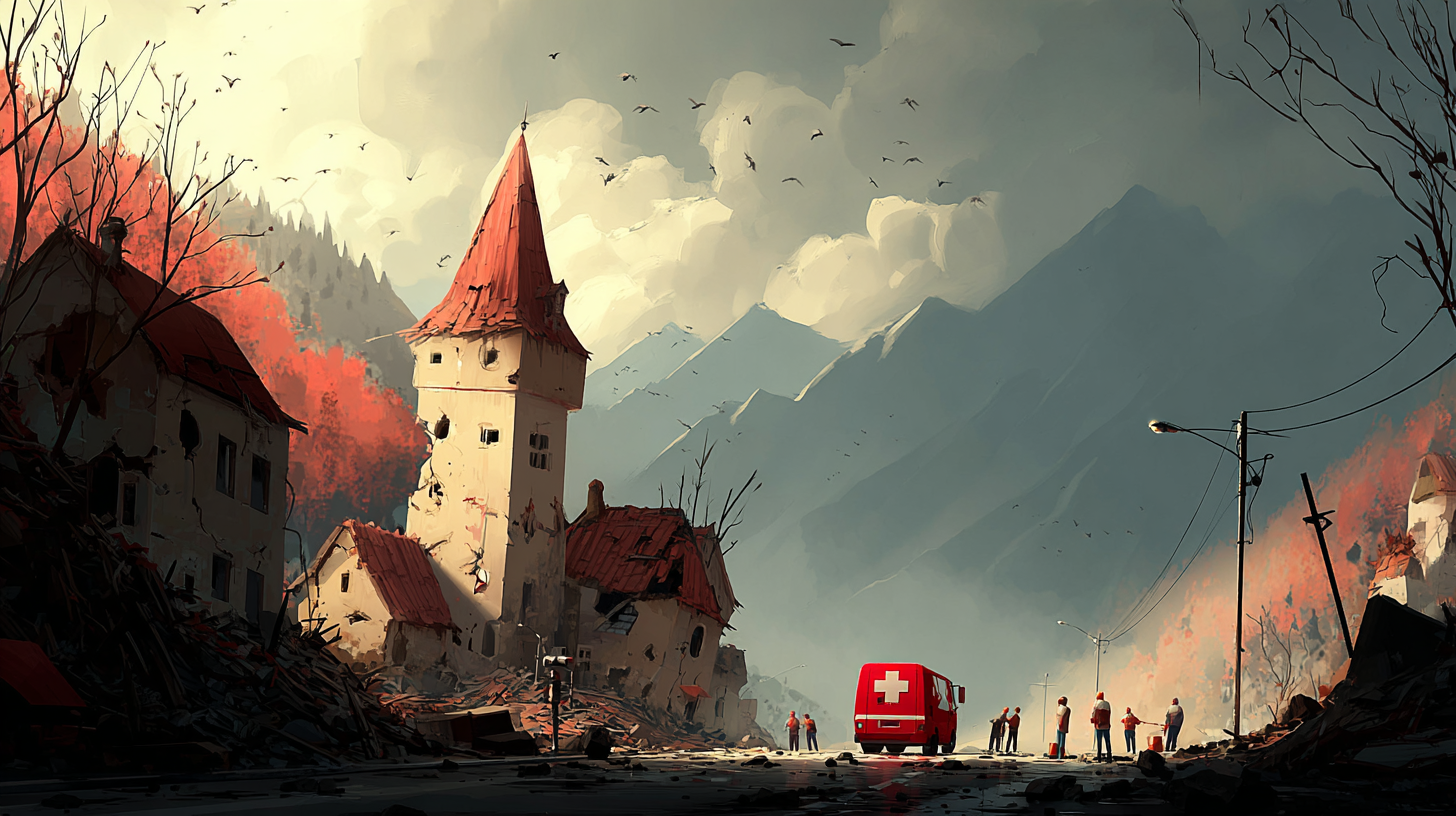“Destruction” means breaking or damaging something badly.
「destruction」は、何かをこわすことやなくしてしまうことです。
以下は英単語 “destruction” に関するストーリー型学習コンテンツです。まずは大枠の意味を理解して最後の文章で確認しましょう。
主な意味(main meaning)
| 品詞 | 意味 | 発音記号 | 英語例文 |
|---|---|---|---|
| 名詞 | 破壊、壊すこと | /dɪˈstrʌkʃən/ | The fire caused massive destruction to the building. |
語源(etymology)
「destruction」はラテン語の destruere(壊す、解体する)から来ています。語根 struct は「建てる」を意味し、de- がつくことで「逆にする」、つまり「建てたものを壊す」というイメージです。
類義語(synonyms)
| 類義語 | 英語例文 |
|---|---|
| ruin | The earthquake left the city in total ruin. |
| devastation | The hurricane caused great devastation along the coast. |
| damage | The storm did a lot of damage to the crops. |
| demolition | The old building is set for demolition next week. |
| wreckage | We found pieces of wreckage from the plane crash. |
反義語(antonyms)
| 反義語 | 英語例文 |
|---|---|
| creation | The artist’s new sculpture is a beautiful creation. |
| construction | The construction of the new school will take one year. |
コロケーション(collocations)
| コロケーション | 英語例文 |
|---|---|
| cause destruction | Wars often cause destruction and suffering. |
| total destruction | The town faced total destruction after the flood. |
| weapons of mass destruction | The country agreed to destroy its weapons of mass destruction. |
| prevent destruction | We must act now to prevent the destruction of forests. |
| lead to destruction | Careless actions can lead to the destruction of nature. |
2項表現(binomials)
| 2項表現 | 英語例文 |
|---|---|
| life and destruction | The movie showed the cycle of life and destruction. |
| death and destruction | The war brought death and destruction to the region. |
英語ストーリー(english story)
Title: The Power of Nature
Last year, my friend Lisa and I joined a volunteer group that helps rebuild towns after natural disasters. One day, we were sent to a small village in the mountains that had just suffered a strong earthquake. When we arrived, we were shocked by the total destruction around us. Homes were broken, roads were cracked, and people were living in tents.
We learned that the earthquake caused massive destruction, leaving many people without food or clean water. The local government was working hard to support the people, but they needed more help. As volunteers, our job was to clean up the wreckage and support families.
Lisa helped in the children’s area, telling stories and giving them comfort. I worked with a team to remove heavy stones and repair small houses. We all wanted to prevent further destruction by making the area safer.
During our break, one of the workers explained how weapons of mass destruction can also cause harm, not just natural events. He said that peace and construction, not war and demolition, were the answers to a better world.
That day, I thought about the difference between creation and destruction. Nature has power, but so do people. We can choose to help or hurt. I realized that even in a place full of death and destruction, we can bring hope, support, and a new beginning.
和訳
タイトル:自然の力
去年、友達のリサと私は、自然災害の後に町を再建するボランティア団体に参加しました。ある日、私たちは大きな地震を受けた山間の小さな村へ行くことになりました。到着して驚いたのは、周囲の**total destruction(完全な破壊)**でした。家は壊れ、道路はひび割れ、人々はテントで暮らしていました。
地震は**massive destruction(大きな破壊)**を引き起こし、多くの人が食べ物やきれいな水を失っていました。地元の政府は支援に努力していましたが、助けが足りませんでした。私たちボランティアは、**wreckage(残骸)**を片づけ、家族を支えるのが仕事でした。
リサは子どものエリアで絵本を読んだり、元気づけたりしていました。私はチームと一緒に大きな石を運び、小さな家を直す作業をしていました。地域をより安全にして**further destruction(さらなる破壊)をprevent(防ぐ)**のが私たちの目標でした。
休憩中、作業員の一人が、**weapons of mass destruction(大量破壊兵器)も自然災害と同じように人々を傷つけると教えてくれました。戦争やdemolition(解体)ではなく、平和とconstruction(建設)**こそが良い世界を作る方法だと言っていました。
その日私は、**creation(創造)とdestruction(破壊)**の違いについて考えました。自然には力がありますが、人間にもあります。助けることも傷つけることも選べます。**death and destruction(死と破壊)**であふれた場所でも、希望や支援、新しい始まりをもたらせることに気づいたのです。
Q&A
- Q「destruction」と「ruin」の違いは?
- A
「destruction(破壊)」は、物や建物、人の生活などを完全に壊すことを意味します。一方で「ruin(荒廃、廃墟)」は、時間とともに崩れていった状態や、破壊された後の残された姿に焦点があります。
例:destructionは地震そのものの力、ruinはその後に残った崩れた街。
- Q「destruction」と「devastation」の違いは?
- A
どちらも強い破壊を表しますが、「devastation(壊滅)」は精神的なショックや深刻な被害の広がりも含みます。自然災害や戦争など、破壊にともなう感情的な衝撃を伝えたいときに使われます。
- Q「destruction」と「damage」の違いは?
- A
「damage(損傷)」は物の一部が壊れることで、完全に使えなくなるとは限りません。「destruction」は物が使えないほど壊れることです。
例:車に傷がついたらdamage、完全に壊れて動かなくなったらdestruction。
- Q「destruction」と「demolition」の違いは?
- A
「demolition(取り壊し)」は、計画的・意図的に壊すことです。たとえば、古いビルを安全に壊すときに使われます。「destruction」は自然災害や戦争など、予期せぬ破壊にも使われます。
- Q「destruction」と「wreckage」の違いは?
- A
「wreckage(残骸)」は、destructionの結果として残るもの(こわれたものの一部)を表します。たとえば飛行機事故後の破片がwreckageです。
- Q「destruction」と「creation」の違いは?
- A
「creation(創造)」は、何かを新しく作ることです。「destruction」はそれを壊すことなので、真逆の関係にあります。
- Q「destruction」と「construction」の違いは?
- A
「construction(建設)」は、建物などを組み立てて作ることです。destructionは、それらをこわすことです。こちらも対義的な関係です。
- Q「prevent destruction」の「prevent」とはどう違う?
- A
「prevent(防ぐ)」は動詞で、「destruction(破壊)」が起こらないようにする行動を指します。たとえば、洪水対策をして建物の破壊を防ぐなどです。
- Q「weapons of mass destruction」はなぜ特別なの?
- A
「weapons of mass destruction(大量破壊兵器)」は、広い範囲で多くの命や建物を一気に破壊できる兵器のことです。核兵器・生物兵器・化学兵器などが含まれます。普通の「weapons(武器)」よりも破壊力と影響がはるかに大きいです。
- Q「lead to destruction」と「cause destruction」の違いは?
- A
「cause destruction(破壊を引き起こす)」は直接的な原因になります。一方、「lead to destruction(破壊につながる)」は、間接的・結果的に破壊をもたらすような場合に使います。
例:爆弾が家を壊す → cause destruction
長年の環境破壊が最終的に森を消す → lead to destruction



コメント